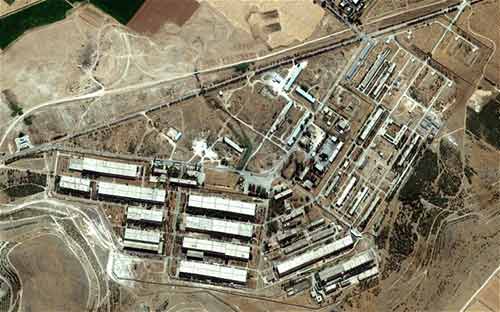
Aerial view of al-Safira chemical weapons facility.
May 1, 2013
On July 23, 2012, Syria admitted possessing a stockpile of chemical weapons, which it claimed are reserved for national defense against foreign countries. One of Syria’s main facilities for producing chemical weapons of mass destruction (WMD), including sarin, a lethal nerve gas, is located in the town of al-Safira, near Aleppo.
The ongoing danger, of course, is that the al-Safira chemical weapons plant might fall to opposition forces, which may include members with links to al-Qaeda.
According to U.S. Defense Secretary Chuck Hagel, “The U.S. intelligence community assesses with some degree of varying confidence that the Syrian regime has used chemical weapons on a small scale in Syria, specifically, the chemical agent sarin.”
Evidence of alleged sarin gas use has supposedly come from human tissue samples. A few dozen Syrians are said to have been killed. If true, did Assad forces or the opposition forces use these chemical weapons and why was only a small amount of sarin used? Was its use just a test to gauge U.S. reaction?
Already there is a call for action against Syria. For example, Senator John McCain (R-Ariz.) has long pressed the Obama administration to take tougher action, saying he hopes the administration will consider establishing a safe area for Assad’s opponents, enforcing a “no-fly” zone and providing weapons to “the people in the resistance who we trust.”
Does the use of chemical weapons violate international law? On September 3, 1992, the Chemical Weapons Convention (CWC) was adopted by the Conference on Disarmament in Geneva. The CWC is the first disarmament agreement that provides for the elimination of an entire category of weapons of mass destruction under universally applied international control.
On 29 April 1997, the Organization for the Prohibition of Chemical Weapons (OPCW) was established to implement the provisions of the CWC and to ensure a credible means to verify the destruction of chemical weapons; to prevent their re-emergence in any member State; to provide protection and assistance against chemical weapons; to encourage international cooperation in the peaceful uses of chemistry; and to achieve universal membership of the OPCW.”
The United States has joined CWC. Syria has neither signed nor acceded to the CWC.
President Obama has warned that the use of chemical weapons by Syria would cross a “red line” and would be “game changer.” However, Hagel and the White House have backed off a bit on this use claim. They are now saying “with a varying degree of confidence” that chemical weapons have been used “on a small scale” inside Syria. “This assessment is based in part on physiological samples. Our standard of evidence must build on these intelligence assessments as we seek to establish credible and corroborated facts. For example, the chain of custody is not clear so we cannot confirm how the exposure occurred and under what conditions.” In other words, if chemical weapons were used, it is not clear whether the Assad forces or the opposition forces used them.
In sum, there seems to be no definitive, credible evidence that chemical weapons have been used in Syria. For this reason, Obama is being very careful before accusing Syria of using chemical weapons.
Remember George W. Bush and his minions? They intentionally built a case for war with Iraq without regard to factual evidence. They took advantage of the public’s hysteria over the September 11, 2001 terrorist attacks on the World Trade Center and the Pentagon to authorize an invasion and occupation of Iraq with no evidence that Iraq had WMDs. No WMDs were found in Iraq. Obama does not want to make the same error of judgment.
But what if it is definitively established that Assad forces have used chemical weapons? Would Obama call for an invasion of Syria or the use of air strikes – as was done in Libya – or the establishment of a no fly zone as Senator McCain suggests? Obama could also authorize the arming of the rebels but these weapons could fall in the hands of terrorist organizations like al-Qaeda.
Or is the U.S. obligated to do anything at all militarily if Syria crosses Obama’s “red line?”
I do not believe the American people have the stomach for another war like Iraq or Afghanistan or the enormous cost of an action like Libya. Presently, there seems to be a stalemate in Syria between the Assad forces and the opposition forces.
But what if Assad is pushed to the wall? Would he then use chemical weapons as a last resort? If so, how would the U.S. respond? Stay tuned.


 The Hunger Site
The Hunger Site
May 1, 2013 at 8:05 pm
What did the U.S. do in Iraq? We committed LITERAL genocide, causing unforeseen rates of birth defects in Basra and Fallujah. The Iraqi people could say the same thing to the Pentagon that a Navajo friend of mine wrote to the California Public Utilities Commission regarding the uranium and coal mining and coal-fired power aggression that has for years brought electricity to California:
“You people have attacked us even in the genes, and our children will suffer for generations to come.”